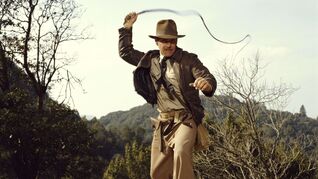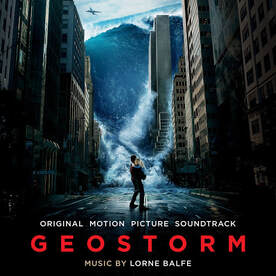 Harrison Ford as Indiana Jones
Harrison Ford as Indiana Jones See any good stories about climate change on TV?
Probably not. And that’s too bad, because there’s nothing like a well-executed story to motivate people to care about an issue. You know the old saying: facts tell, but stories sell. Numbers numb and stats sedate, but a rip-roaring tale makes the heart dilate.
Sure, you can find some strong documentaries, such as Al Gore’s Oscar-winning An Inconvenient Truth (2006) and the acclaimed series Years of Living Dangerously (2014-2016) that featured celebrities learning about global warming and its impacts. I mostly recall Harrison Ford looking ready to horsewhip an Indonesian bureaucrat complicit in burning rainforests. A planned BBC documentary about climate activist Greta Thunberg sounds promising.
Probably not. And that’s too bad, because there’s nothing like a well-executed story to motivate people to care about an issue. You know the old saying: facts tell, but stories sell. Numbers numb and stats sedate, but a rip-roaring tale makes the heart dilate.
Sure, you can find some strong documentaries, such as Al Gore’s Oscar-winning An Inconvenient Truth (2006) and the acclaimed series Years of Living Dangerously (2014-2016) that featured celebrities learning about global warming and its impacts. I mostly recall Harrison Ford looking ready to horsewhip an Indonesian bureaucrat complicit in burning rainforests. A planned BBC documentary about climate activist Greta Thunberg sounds promising.
 Your Basic, Very Big Ice Shelf
Your Basic, Very Big Ice Shelf On TV news, it’s all coronavirus all the time. Plus the collapsing economy, protests against racism and police brutality, the election…so when the Siberian town of Verkhoyansk hit 100 degrees Fahrenheit on June 20th, turning local permafrost to goo and causing a massive burp of climate -altering methane, there was scant mention on the major news channels – CBS CNN, MSNBC, FOX News – or the nightly broadcasts on ABC, NBC and CBS. Yeah, PBS covered the story, but who watches that who needs convincing?
At the end of July, when the Milne Ice Shelf in the Canadian Arctic collapsed, dropping into the drink an ice-shelf-cube with an area greater than the island of Manhattan, well, it barely made a news splash. Crickets.
TV dramas? Nothing much. The 2019 British satire about the 2020s, Years and Years, includes a sub-plot about climate-change induced flooding, mixed in with a nuclear strike, banking crisis and monkey flu pandemic. HBO Max announced in 2020, before Covid-19 leaped oceans, their commitment to making a series of fictional stories based on David Wallace-Wells’ non-fiction bestseller The Uninhabitable Earth. Fingers crossed; not holding my breath.
At the end of July, when the Milne Ice Shelf in the Canadian Arctic collapsed, dropping into the drink an ice-shelf-cube with an area greater than the island of Manhattan, well, it barely made a news splash. Crickets.
TV dramas? Nothing much. The 2019 British satire about the 2020s, Years and Years, includes a sub-plot about climate-change induced flooding, mixed in with a nuclear strike, banking crisis and monkey flu pandemic. HBO Max announced in 2020, before Covid-19 leaped oceans, their commitment to making a series of fictional stories based on David Wallace-Wells’ non-fiction bestseller The Uninhabitable Earth. Fingers crossed; not holding my breath.
 Geostorm: Tech Will Save Us
Geostorm: Tech Will Save Us Okay, how about the movies? With theaters shuttered due to Covid-19, it’s not “what’s playing?” but “what do we want to play?” Endless streaming choices, alas, offer little for anyone willing to try a dramatization of climate change in a fictional context. There’s always The Day After Tomorrow (2004), which is about how rising temperatures cause the world to…freeze over? Not likely. In the blustery Geostorm (2017), smart guys build a network of weather-manipulating satellites to defeat climate change in the first ten minutes, and then the action starts.
According to David Wallace-Wells, mainstream films and TV shows have so far failed to take on climate change directly. Instead we get a smattering of “stories that distract even as they appear to engage,” that “deliver sublimation and diversion.” Post-apocalyptic films like Interstellar, Snowpiercer and Mad Max: Fury Road, set in future hellscapes created at least in part by climate change, skip over the slow-motion, intermediate agony.
Wallace-Wells also notes that the window for mass viewer engagement could close within a few decades. Right now, he states, there’s a potential audience for stories about climate when it’s still “a marginal feature of human life, or an overwhelming feature of lives marginal to your own. But at three degrees [Celsius] of warming, or four, hardly anyone will be able to feel insulated from its impact – or want to watch it onscreen as they watch it out their windows.” By then, climate change may “cease to be a story and become, instead, an all-encompassing setting.”
According to David Wallace-Wells, mainstream films and TV shows have so far failed to take on climate change directly. Instead we get a smattering of “stories that distract even as they appear to engage,” that “deliver sublimation and diversion.” Post-apocalyptic films like Interstellar, Snowpiercer and Mad Max: Fury Road, set in future hellscapes created at least in part by climate change, skip over the slow-motion, intermediate agony.
Wallace-Wells also notes that the window for mass viewer engagement could close within a few decades. Right now, he states, there’s a potential audience for stories about climate when it’s still “a marginal feature of human life, or an overwhelming feature of lives marginal to your own. But at three degrees [Celsius] of warming, or four, hardly anyone will be able to feel insulated from its impact – or want to watch it onscreen as they watch it out their windows.” By then, climate change may “cease to be a story and become, instead, an all-encompassing setting.”
 Forgiveness, Actually, Isn't Easy
Forgiveness, Actually, Isn't Easy Rather than just complain about the mutating entertainment colossus known as Hollywood, I’ve written a TV pilot, Forgiveness, depicting a fractured United States of the 2040s that’s both severely impacted by climate change and still recognizable. It places young and middle-aged viewers in a pretty crappy but not apocalyptic future that could occur, according to accepted scientific models, within their lifetimes. And it allows older viewers to experience the degraded world that their adorable grandchildren and great-grandchildren may be forced to negotiate.
Those kids, of course, grow up and take stock. Some blame their elders and reach for revenge, some fall into cynicism or despair. Many retreat into fantasy realms, dream of long-shot techno-solutions, or build utopian communities away from regions worst-hit by climate change. However a small number of young people -- including my story’s main character, an epically stubborn female scientist -- search for a meaningful way to forgive the generations before them who saw the calamity coming and did little or nothing to prevent it.
I’m still working on the script. It needs more oomph and action to attract serious attention, I suspect. So, oomph and action, coming up.
Those kids, of course, grow up and take stock. Some blame their elders and reach for revenge, some fall into cynicism or despair. Many retreat into fantasy realms, dream of long-shot techno-solutions, or build utopian communities away from regions worst-hit by climate change. However a small number of young people -- including my story’s main character, an epically stubborn female scientist -- search for a meaningful way to forgive the generations before them who saw the calamity coming and did little or nothing to prevent it.
I’m still working on the script. It needs more oomph and action to attract serious attention, I suspect. So, oomph and action, coming up.
 RSS Feed
RSS Feed